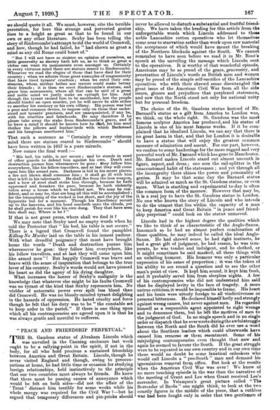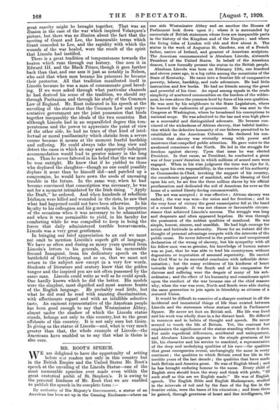"PEACE AND FRIENDSHIP PERPETUAL."
THE St. Gaudens statue of Abraham Lincoln which was unveiled in the Canning enclosure last week ought to be a rallying-point in the spirit, if not in the body, for all who hold precious a sustained friendship between America and Great Britain. Lincoln, though he never visited England and though, owing to preoccu- pations at home, he had little time or occasion for studying foreign relationships, held instinctively to the principle that our two countries must always be friends. He knew that there must be passing causes of annoyance which would be felt on both sides—did not the affair of the ' Trent ' distract him terribly for some weeks while his whole energy was required for the Civil War ?—but he argued that temporary differences and pin-pricks should never be allowed to disturb a substantial and fruitful friend- ship. We have taken the heading for this article from -.the unforgettable words which Lincoln addressed to those noble Lancashire cotton operatives who let themselves come near to starvation rather than work upon raw material the acceptance of which would have meant the breaking of the Northern blockade against the South. We cannot remember to have seen before we read it in Mr. Root's speech at the unveiling the message which Lincoln sent to the operatives. It is worthy of that wonderful episode. Americans may be as proud of the grace, generosity, and penetration of Lincoln's words as British men and women may be proud of the simple self-sacrifice of the Lancashire operatives who with their shrewd sense disentangled the great issue of the American Civil War from all the side issues, glosses and prejudices that perplexed statesmen, and saw that the North stood not only for national unity but for personal freedom.
The choice of the St. Gaudens statue instead of Mr. Barnard's statue as a gift from America to London was, we think, on the whole right. St. Gaudens was the most famous sculptor America has produced, and. his statue of Lincoln is one of his most famous works. If it be com- plained that he idealized Lincoln, we can say that there is no great harm in that, and that for London it is desirable to have a statue that will enjoy the greatest common measure of admiration and assent. For our part, however, we confess to some hankerings for the more rugged and very powerful work of Mr. Barnard which has gone to Manchester. Mr. Barnard makes Lincoln stand out almost uncouth in figure, aspect, and dress ; one sees the rail-splitter in the unaccustomed habit of the statesman ; and yet through all the incongruity there shines the power and personality of genius. It may be that some day the Barnard statue will be admired as much as the St. Gaudens statue, or even more. What is startling and experimental to-day is often the common form of the morrow. However that may be, it is a real joy to have the St. Gaudens statue in London. No one who knows the story of Lincoln and who intends to do the utmost that lies within the capacity of a man • to keep America and Great Britain "in peace and friend- ship perpetual" could look on the statue unmoved.
Lincoln had in the highest degree the qualities which we like to think of as characteristic of the Anglo-Saxon. Inasmuch as he had an almost perfect combination of those qualities, he may indeed be called the ideal Anglo- Saxon. He had shrewd sense, he had right instincts, he had a great gift of judgment, he had reason, he was tem- perate, he was tender and indulgent, and he clothed, or it might sometimes be said masked, all these things with an unfailing humour. His humour was only a particular expression of his sense of proportion ; it was the token of his ability to see round a question and to see the other man's point of view. It kept him sound, it kept him fresh, and -it probably saved him from sleepless nights. A few of his contemporaries who did not understand him said that he displayed levity in the face of tragedy. A more untrue criticism it would be impossible to frame. His heart and his brain were utterly foreign to all vindictiveness or personal bitterness. He declared himself hotly and strongly against wrong causes, but never against men. He regarded himself as a responsible agent appointed to right wrongs and to denounce them, but he left the motives of men to the judgment of God. In no single speech and in no single order or dispatch that he overwrote during the awfuletru.ggle between the North and the South did he ever use a word about the Southern leaders which could afterwards have • caused him remorse or them resentment. Some of his misjudging contemporaries even thought that now and again he seemed to favour the South. If the great struggle were to be repeated in our own country and in our own time there would no doubt be some fanatical onlookers who would call Lincoln a " pro-South " man and demand his ignominious removal from office. But look at the results when the American Civil War was over ! We know of no more touching episode in the war than the narrative of the meeting of Grant and Lee when Grant received Lee's surrender. In Velazquez's great picture called "The Surrender of Breda" one might think, to look at the two courtly figures in the middle of the piece, that a ruthless war had been fought only in order that two gentlemen of Feat suavity might be brought together. That was an illusion in the case of the war which inspired Velazquez's picture, but there was no illusion about the fact that the meeting of Grant and Lee, the honourable terms which Grant conceded to Lee, and the rapidity with which the wounds of the war healed, were the result of the spirit that Lincoln had instilled.
There is a great tradition of temperateness towards the beaten which runs through our history. One sees it in Edward III. and the Black Prince, though it goes further back than that, and one sees it just as notably in Nelson, who said that when men became his prisoners he became their protector. All that tradition manifested itself in Lincoln because he was a man of consummate good breed- ing. If we were asked through what particular channels he had derived his sense of the tradition, we should say through Puritanism and through his study of the Common Law of England. Mr. Root indicated in his speech at the unveiling of the statue that the Common Law and repre- sentative government are the joint possession that binds together inseparably the ideals of the two countries But although Lincoln had in an -unparalleled degree this tem- perateness and the power to appreciate the point of view of the other side, he had no trace of that kind of intel- lectual or moral pusillanimity which shrinks from a severe course because it means at the moment fearful hardship and suffering. He could always take the long view and detect the cases in which an easy and apparently indulgent accommodation would lead to greater misery in the long run. Thus he never faltered in his belief that the war must be won outright. He knew that if he yielded to those who deplored the slaughter—though no one could possibly deplore it more than he himself did—and patched up a compromise, he would have sown the seeds of unceasing trouble in the future. In the same way, when he had become convinced that conscription was necessary, he was not for a moment intimidated by the Irish rising. "Apply the Draft," he ordered. And when hundreds of rebellious Irishmen were killed and wounded in the riots, he saw that what had happened could not have been otherwise. In his loyalty to his colleagues and his ganerals, in his perception of the occasions when it was necessary to be adamantine and when it was permissible to yield, in his faculty for comforting while he was compelled to keep in being the forces that daily administered terrible bereavements, Lincoln was a very great gentleman. In bringing our brief appreciation to an end we must not omit to mention Lincoln's superb gift of language. We have so often and during so many years quoted from Lincoln's letters to his generals, from his memorable Second Inaugural, from his dedicatory speech on the battlefield of Gettysburg, and so on, that we must not return to the subject now except in a very few words. Students of literature and oratory know that the golden tongue and the inspired pen are not often possessed by the same man. Lincoln could write as well as he could speak. One hardly knows which he did the better. His models were the simplest, most dignified and most austere founts of the English language. He probably read little, but what he did read he read with amazing discrimination, with affectionate regard and with an infallible selective taste. An eminent representative of the American people has been good enough to say that Westminster Abbey, almost under the shadow of which the Lincoln statue stands, belongs not only to this country, but to the great offshoots of this country. It is not only ours but theirs. In giving us the statue of Lincoln—and, what is very much greater than that, the whole example of Lincoln—the Americans have enabled us to say that what is theirs is also ours.



































 Previous page
Previous page